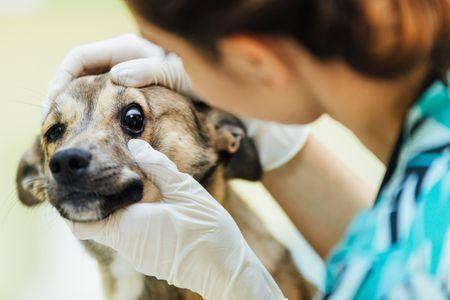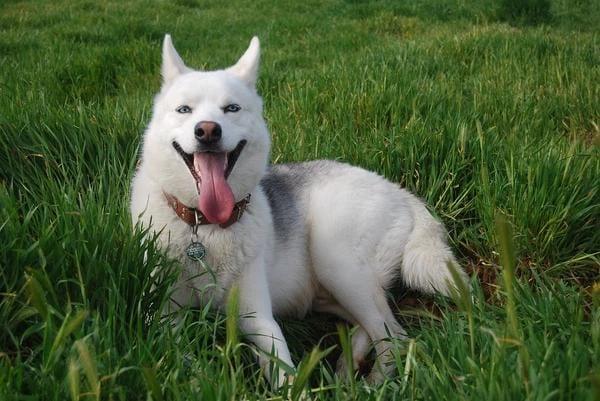Source: https://www.thesprucepets.com/treating-glaucoma-in-dogs-4779856
As dogs age, they experience many of the same health issues that humans do, including autoimmune diseases, diabetes, and kidney and liver diseases. These conditions can also cause dogs to go blind and seriously impact their quality of life. But by identifying symptoms of blindness early, you can prevent further health issues and possibly even save your dog's eyesight. How to Properly Tell If Your Dog Going Blind
Related: 6 Facts Your Vet Wished You Knew About Keeping Your Dog Healthy
How to Tell if Your Dog Is Going Blind
Most dogs lose their vision gradually, which can make signs of blindness hard to notice. Sometimes, dog owners blame other causes or conditions for symptoms that mean their dog is going blind, which delays needed treatment or care. Watch for the following signs that indicate blindness in dogs.
Subtler Signs
- Staying in the familiar rooms of a house and not exploring new spaces
- Unusually defensive or aggressive behavior
- Depression, anxiety, and fear
- Lethargy
- Less playful or not engaging in activities they previously loved
More Obvious Signs
- Cloudy eyes or white spot in eyes. If your dog develops small white spots in their eyes or a veil over their eye, you need to have them assessed for cataracts or glaucoma. As these changes tend to happen gradually, comparing your dog's eyes now with pictures of them taken years previous can help you spot changes over time.
- Making less eye contact or none at all. If your dog once happily made eye contact but no longer does, they may no longer be able to distinguish small details, like your facial features, due to vision loss.
- Incorrect pupil dilation. Just like human pupils, canine pupils adjust to bright light and the dark. If their pupils don't respond to light, your dog could be going blind. You can test this response with a flashlight.
- Increased clumsiness. As dogs lose vision, they run into furniture more often, misjudge jumps, and stumble on stairs. They have even more trouble with rearranged furniture and new rooms or spaces.

Is your dog showing symptoms of blindness? Dope Dog makes holistic products to help treat your pet, including CBD for dogs that can help relieve anxiety and pain while improving your blind dog's quality of life!
Related: Best CBD Oil for Dogs
Common Causes of Vision Loss in Dogs
Old age, hereditary conditions, disease, and injury can all cause blindness in dogs. Dogs naturally lose vision as they age, from developing minor vision issues to complete blindness, but underlying conditions can also be at fault. Heart disease, systemic diseases, and liver or kidney disorders can all cause blindness in dogs. The following are common health issues that cause such vision loss.
Cataracts
When protein builds up in the lens of your dog's eye, a cataract forms, causing the eye to appear cloudy. Cataracts stop light from fully reaching the retinas in a blind dog's eyes, and the affected dog can go completely blind as a result. An operation can treat cataracts and potentially prevent blindness but is more likely to succeed with cataracts identified early.
Diabetes
Diabetes in dogs is on the rise and can cause significant vision problems. 80% of diabetic dogs will develop cataracts within 16 months of diagnosis, resulting in partial or complete blindness. Dogs with poor nutrition, obese dogs, breeding females, and older dogs from larger breeds have the highest risk of developing diabetes.
Glaucoma
Dogs may develop glaucoma, a painful eyes condition that feels similar to migraine headaches. Dogs with green or yellow eye discharge, bloodshot eyes, dilated pupils, or slow reactions to bright light need to visit a vet immediately to get screened for glaucoma. Treatment is available for this condition, but early diagnosis is critical if you want your dog to get the best results. And when left untreated, glaucoma can cause partial and complete blindness.
Sudden Acquired Retinal Degeneration Syndrome
In Sudden Acquired Retinal Degeneration Syndrome (SARDS), dogs' retinas deteriorate, causing blindness in both eyes. Dogs can go completely blind in just a few days or weeks due to the rapid progression of SARDS. Because the onset is so fast, dogs with this syndrome also have a much harder time adjusting to vision loss and display more behavioral symptoms associated with blindness.
Progressive Retinal Atrophy
Progressive Retinal Atrophy (PRA) is a painless, inherited eye condition that causes a dog's retina to deteriorate. Dogs with PRA can go completely blind in both eyes. Because PRA develops more slowly than SARDS, dogs with this condition tend to adjust to their vision loss better than dogs with SARDS.
Treatment Options for Blind Dog Eyes
Treatments exist for many conditions that cause blindness in dogs, and the early they receive treatment, the better the outcome will be for your dog. If you identify and treat these conditions early, you may be able to save your dog's eyesight or at least help them cope better with vision loss.
Conditions that cause blindness in dogs can also lead to other health issues, so it's important to speak with a vet or other animal practitioner as soon as you notice symptoms. That way, you can prevent further health problems and mitigate the pain your dog might experience as a result.

Caring for Your Blind Dog
Blind dogs can still live full, happy lives, but they need a little extra care from their owners to effectively navigate the world. You can take the following steps to improve your visually impaired dog's quality of life.
- Always place your dog's food and water bowls in the same spots so they can find them easily.
- Avoid rearranging furniture and rooms in your house.
- If you do make changes, show your dog what they are so they won't be caught unaware by differences.
- Dedicate a large kennel or small, unchanging room to your dog so they'll have a safe, predictable space all their own. You can add blankets and items with your scent to make the space feel even safer for your dog.
- Assess your house for any furniture or dangerous objects that could hurt your blind dog if they run into or trip over them. Change things up to keep your dog safe.
- Walk into a room with heavy steps or say hello upon entering to avoid frightening your dog. Do the same before petting or snuggling them.
Related: Dog Anxiety: What Dog Owners Need to Know
Are you looking for additional ways you can care for a blind dog? Dope Dog's CBD products can help alleviate pain for dogs and mitigate anxiety as they adjust to their visual impairment!


















